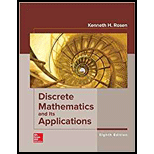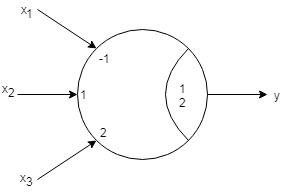
DISCRETE MATHEMATICS+ITS APPL. (LL)-W/A
8th Edition
ISBN: 9781260521337
Author: ROSEN
Publisher: MCG
expand_more
expand_more
format_list_bulleted
Concept explainers
Question
Chapter 12, Problem 21SE
To determine
A threshold gate represents a Boolean function. Find a Boolean expression for the Boolean function represented by this threshold gate.

Expert Solution & Answer
Want to see the full answer?
Check out a sample textbook solution
Students have asked these similar questions
f(x) = x + 1; x(x) = x − 2.
Solve the equation for x :
|f(x)+4(x)| = |f(x)|+|4(x)|.
00
Solve no chatgpt already got wrong chatgpt answer
Not use ai please
Chapter 12 Solutions
DISCRETE MATHEMATICS+ITS APPL. (LL)-W/A
Ch. 12.1 - Prob. 1ECh. 12.1 - Find the values, if any, of the Boolean...Ch. 12.1 - a) Show that(1.1)+(0.1+0)=1 . b) Translate the...Ch. 12.1 - a) Show that(10)+(10)=1 . b) Translate the...Ch. 12.1 - Use a table to express the values of each of these...Ch. 12.1 - Use a table to express the values of each of these...Ch. 12.1 - Use a 3-cubeQ3to represent each of the Boolean...Ch. 12.1 - Use a 3-cubeQ3to represent each of the Boolean...Ch. 12.1 - What values of the Boolean...Ch. 12.1 - How many different Boolean functions are there of...
Ch. 12.1 - Prove the absorption lawx+xy=x using the other...Ch. 12.1 - Show thatF(x,y,z)=xy+xz+yz has the value 1 if and...Ch. 12.1 - Show thatxy+yz+xz=xy+yz+xz .Ch. 12.1 - 3Exercises 14-23 deal the Boolean algebra {0, 1}...Ch. 12.1 - Exercises 14-23 deal with the Boolean algebra {0,...Ch. 12.1 - Prob. 16ECh. 12.1 - Exercises 14-23 deal with the Boolean algebra {0,...Ch. 12.1 - Prob. 18ECh. 12.1 - Prob. 19ECh. 12.1 - Prob. 20ECh. 12.1 - Prob. 21ECh. 12.1 - Prob. 22ECh. 12.1 - Exercises 4-3 deal with the Boolean algebra {0, 1}...Ch. 12.1 - Prob. 24ECh. 12.1 - Prob. 25ECh. 12.1 - Prob. 26ECh. 12.1 - Prove or disprove these equalities. a)x(yz)=(xy)z...Ch. 12.1 - Find the duals of these Boolean expressions. a)x+y...Ch. 12.1 - Prob. 29ECh. 12.1 - Show that ifFandGare Boolean functions represented...Ch. 12.1 - How many different Boolean functionsF(x,y,z) are...Ch. 12.1 - How many different Boolean functionsF(x,y,z) are...Ch. 12.1 - Show that you obtain De Morgan’s laws for...Ch. 12.1 - Show that you obtain the ab,sorption laws for...Ch. 12.1 - In Exercises 35-42, use the laws in Definition 1...Ch. 12.1 - In Exercises 35-42, use the laws in Definition to...Ch. 12.1 - Prob. 37ECh. 12.1 - Prob. 38ECh. 12.1 - In Exercises 35-42, use the laws in Definition 1...Ch. 12.1 - Prob. 40ECh. 12.1 - Prob. 41ECh. 12.1 - Prob. 42ECh. 12.1 - Prob. 43ECh. 12.2 - Find a Boolean product of the Boolean...Ch. 12.2 - Find the sum of products expansions of these...Ch. 12.2 - Find the sum-of-products expansions of these...Ch. 12.2 - Find the sum-of-products expansions of the Boolean...Ch. 12.2 - Find the sum-of -products expansion of the Boolean...Ch. 12.2 - Find the sum-of-products expansion of the Boolean...Ch. 12.2 - Another way to find a Boolean expression that...Ch. 12.2 - Prob. 8ECh. 12.2 - Prob. 9ECh. 12.2 - Another way to find a Boolean expression that...Ch. 12.2 - Prob. 11ECh. 12.2 - Express each of these Boolean functions using the...Ch. 12.2 - Express each of the Boolean functions in...Ch. 12.2 - Show that a)x=xx . b)xy=(xy)(xy) . c)x+y=(xx)(yy)...Ch. 12.2 - Prob. 15ECh. 12.2 - Show that{} is functionally complete using...Ch. 12.2 - Express each of the Boolean functions in Exercise...Ch. 12.2 - Express each of the Boolean functions in Exercise...Ch. 12.2 - Show that the set of operators{+,} is not...Ch. 12.2 - Are these sets of operators functionally complete?...Ch. 12.3 - In Exercises 1—5 find the output of the given...Ch. 12.3 - In Exercises 1—5 find the output of the given...Ch. 12.3 - In Exercises 1—5 find the output of the given...Ch. 12.3 - In Exercises 1—5 find the output of the given...Ch. 12.3 - In Exercises 1—5 find the output of the given...Ch. 12.3 - Construct circuits from inverters, AND gates, and...Ch. 12.3 - Design a circuit that implements majority voting...Ch. 12.3 - Design a circuit for a light fixture controlled by...Ch. 12.3 - Show how the sum of two five-bit integers can be...Ch. 12.3 - Construct a circuit for a half subtractor using...Ch. 12.3 - Construct a circuit for a full subtractor using...Ch. 12.3 - Use the circuits from Exercises 10 and 11 to find...Ch. 12.3 - Construct a circuit that compares the two-bit...Ch. 12.3 - Construct a circuit that computes the product of...Ch. 12.3 - Use NAND gates to construct circuits with these...Ch. 12.3 - Use NOR gates to construct circuits for the...Ch. 12.3 - Construct a half adder using NAND gates.Ch. 12.3 - Construct a half adder using NOR gates.Ch. 12.3 - Construct a multiplexer using AND gates, OR gates,...Ch. 12.3 - Find the depth of a) the circuit constructed in...Ch. 12.4 - Prob. 1ECh. 12.4 - Find the sum-of-products expansions represented by...Ch. 12.4 - Draw the K-maps of these sum-of-products...Ch. 12.4 - Use a K-map to find a minimal expansion as a...Ch. 12.4 - a) Draw a K-map for a function in three variables....Ch. 12.4 - Use K-maps to find simpler circuits with the same...Ch. 12.4 - Prob. 7ECh. 12.4 - Prob. 8ECh. 12.4 - Construct a K-map for F(x,y,z) =xz + yz+y z. Use...Ch. 12.4 - Draw the 3-cube Q3 and label each vertex with the...Ch. 12.4 - Prob. 11ECh. 12.4 - Use a K-map to find a minimal expansion as a...Ch. 12.4 - a) Draw a K-map for a function in four variables....Ch. 12.4 - Use a K-map to find a minimal expansion as a...Ch. 12.4 - Find the cells in a K-map for Boolean functions...Ch. 12.4 - How many cells in a K-map for Boolean functions...Ch. 12.4 - a) How many cells does a K-map in six variables...Ch. 12.4 - Show that cells in a K-map for Boolean functions...Ch. 12.4 - Which rows and which columns of a 4 x 16 map for...Ch. 12.4 - Prob. 20ECh. 12.4 - Prob. 21ECh. 12.4 - Use the Quine-McCluskey method to simplify the...Ch. 12.4 - Use the Quine—McCluskey method to simp1i’ the...Ch. 12.4 - Prob. 24ECh. 12.4 - Use the Quine—McCluskey method to simplify the...Ch. 12.4 - Prob. 26ECh. 12.4 - Prob. 27ECh. 12.4 - Prob. 28ECh. 12.4 - Prob. 29ECh. 12.4 - Prob. 30ECh. 12.4 - Prob. 31ECh. 12.4 - Prob. 32ECh. 12.4 - show that products of k literals correspond to...Ch. 12 - Define a Boolean function of degreen.Ch. 12 - Prob. 2RQCh. 12 - Prob. 3RQCh. 12 - Prob. 4RQCh. 12 - Prob. 5RQCh. 12 - Prob. 6RQCh. 12 - Explain how to build a circuit for a light...Ch. 12 - Prob. 8RQCh. 12 - Is there a single type of logic gate that can be...Ch. 12 - a) Explain how K-maps can be used to simplify...Ch. 12 - a) Explain how K-maps can be used to simplify...Ch. 12 - a) What is a don’t care condition? b) Explain how...Ch. 12 - a) Explain how to use the Quine-McCluskev method...Ch. 12 - Prob. 1SECh. 12 - Prob. 2SECh. 12 - Prob. 3SECh. 12 - Prob. 4SECh. 12 - Prob. 5SECh. 12 - Prob. 6SECh. 12 - Prob. 7SECh. 12 - Prob. 8SECh. 12 - Prob. 9SECh. 12 - Prob. 10SECh. 12 - Prob. 11SECh. 12 - Prob. 12SECh. 12 - Prob. 13SECh. 12 - Prob. 14SECh. 12 - Prob. 15SECh. 12 - Prob. 16SECh. 12 - How many of the 16 Boolean functions in two...Ch. 12 - Prob. 18SECh. 12 - Prob. 19SECh. 12 - Design a circuit that determines whether three or...Ch. 12 - Prob. 21SECh. 12 - A Boolean function that can be represented by a...Ch. 12 - Prob. 23SECh. 12 - Prob. 24SECh. 12 - Given the values of two Boolean variablesxandy,...Ch. 12 - Prob. 2CPCh. 12 - Prob. 3CPCh. 12 - Prob. 4CPCh. 12 - Prob. 5CPCh. 12 - Prob. 6CPCh. 12 - Prob. 7CPCh. 12 - Prob. 8CPCh. 12 - Prob. 9CPCh. 12 - Given the table of values of a Boolean function,...Ch. 12 - Prob. 11CPCh. 12 - Prob. 12CPCh. 12 - Prob. 1CAECh. 12 - Prob. 2CAECh. 12 - Prob. 3CAECh. 12 - Prob. 4CAECh. 12 - Prob. 5CAECh. 12 - Prob. 6CAECh. 12 - Prob. 7CAECh. 12 - Describe some of the early machines devised to...Ch. 12 - Explain the difference between combinational...Ch. 12 - Prob. 3WPCh. 12 - Prob. 4WPCh. 12 - Find out how logic gates are physically...Ch. 12 - Explain howdependency notationcan be used to...Ch. 12 - Describe how multiplexers are used to build...Ch. 12 - Explain the advantages of using threshold gates to...Ch. 12 - Describe the concept ofhazard-free switching...Ch. 12 - Explain how to use K-maps to minimize functions of...Ch. 12 - Prob. 11WPCh. 12 - Describe what is meant by the functional...
Knowledge Booster
Learn more about
Need a deep-dive on the concept behind this application? Look no further. Learn more about this topic, subject and related others by exploring similar questions and additional content below.Similar questions
- You may need to use the appropriate appendix table or technology to answer this question. You are given the following information obtained from a random sample of 4 observations. 24 48 31 57 You want to determine whether or not the mean of the population from which this sample was taken is significantly different from 49. (Assume the population is normally distributed.) (a) State the null and the alternative hypotheses. (Enter != for ≠ as needed.) H0: Ha: (b) Determine the test statistic. (Round your answer to three decimal places.) (c) Determine the p-value, and at the 5% level of significance, test to determine whether or not the mean of the population is significantly different from 49. Find the p-value. (Round your answer to four decimal places.) p-value = State your conclusion. Reject H0. There is insufficient evidence to conclude that the mean of the population is different from 49.Do not reject H0. There is sufficient evidence to conclude that the…arrow_forward17arrow_forwardNo chatgpt plsarrow_forward
arrow_back_ios
SEE MORE QUESTIONS
arrow_forward_ios
Recommended textbooks for you
 Discrete Mathematics and Its Applications ( 8th I...MathISBN:9781259676512Author:Kenneth H RosenPublisher:McGraw-Hill Education
Discrete Mathematics and Its Applications ( 8th I...MathISBN:9781259676512Author:Kenneth H RosenPublisher:McGraw-Hill Education Mathematics for Elementary Teachers with Activiti...MathISBN:9780134392790Author:Beckmann, SybillaPublisher:PEARSON
Mathematics for Elementary Teachers with Activiti...MathISBN:9780134392790Author:Beckmann, SybillaPublisher:PEARSON
 Thinking Mathematically (7th Edition)MathISBN:9780134683713Author:Robert F. BlitzerPublisher:PEARSON
Thinking Mathematically (7th Edition)MathISBN:9780134683713Author:Robert F. BlitzerPublisher:PEARSON Discrete Mathematics With ApplicationsMathISBN:9781337694193Author:EPP, Susanna S.Publisher:Cengage Learning,
Discrete Mathematics With ApplicationsMathISBN:9781337694193Author:EPP, Susanna S.Publisher:Cengage Learning, Pathways To Math Literacy (looseleaf)MathISBN:9781259985607Author:David Sobecki Professor, Brian A. MercerPublisher:McGraw-Hill Education
Pathways To Math Literacy (looseleaf)MathISBN:9781259985607Author:David Sobecki Professor, Brian A. MercerPublisher:McGraw-Hill Education

Discrete Mathematics and Its Applications ( 8th I...
Math
ISBN:9781259676512
Author:Kenneth H Rosen
Publisher:McGraw-Hill Education

Mathematics for Elementary Teachers with Activiti...
Math
ISBN:9780134392790
Author:Beckmann, Sybilla
Publisher:PEARSON


Thinking Mathematically (7th Edition)
Math
ISBN:9780134683713
Author:Robert F. Blitzer
Publisher:PEARSON

Discrete Mathematics With Applications
Math
ISBN:9781337694193
Author:EPP, Susanna S.
Publisher:Cengage Learning,

Pathways To Math Literacy (looseleaf)
Math
ISBN:9781259985607
Author:David Sobecki Professor, Brian A. Mercer
Publisher:McGraw-Hill Education
Statistics 4.1 Point Estimators; Author: Dr. Jack L. Jackson II;https://www.youtube.com/watch?v=2MrI0J8XCEE;License: Standard YouTube License, CC-BY
Statistics 101: Point Estimators; Author: Brandon Foltz;https://www.youtube.com/watch?v=4v41z3HwLaM;License: Standard YouTube License, CC-BY
Central limit theorem; Author: 365 Data Science;https://www.youtube.com/watch?v=b5xQmk9veZ4;License: Standard YouTube License, CC-BY
Point Estimate Definition & Example; Author: Prof. Essa;https://www.youtube.com/watch?v=OTVwtvQmSn0;License: Standard Youtube License
Point Estimation; Author: Vamsidhar Ambatipudi;https://www.youtube.com/watch?v=flqhlM2bZWc;License: Standard Youtube License